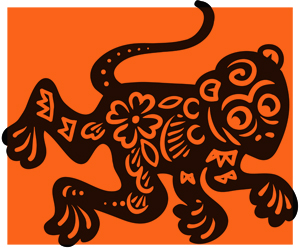Monkeys Will Only Let You Down

THAT MONTH-LONG stay this summer at an artist residency in Portobelo, Panama left quite an impression on my wife. So this weekend when we rode our bikes past a wooded area in Oak Cliff and speculated about what was rustling the trees a few yards away, I wasn’t surprised by what she said.
“Monkeys. Whenever we heard rustling in the trees in Panama, we’d say it was monkeys.”
And as close friends will do, we went stream-of-consciousness from there, down Shared Memory Lane. I proffered Squirrel Monkey. She countered with Orange Monkey. (These are shared memories in the sense that while not her own, I’ve shared them with her and we revisit them from time to time.) The first is a bitter and painful memory, but the second will make me smile right up to the moment I depart this life.
1. Squirrel Monkey was the monkey-in-a-teacup monkey (actually, as I later learned, a capuchin monkey) that the babysitter promised to my sister and me if we’d be good for her. We cooperated, and then I waited months for a monkey that never came. Okay, that’s enough. I don’t want to talk about it anymore.
2. Orange Monkey, by contrast, is the memory I’ll cherish forever. It should be noted that, at the time, the incident caused my daughter momentary trauma. So to be safe, I texted her earlier to make sure she was okay with my disclosure. Her response affirmed for me that either time had healed her wounds or that she has successfully blocked it from recall:
(Me) “I’m planning a blog post on the crucial subject of monkeys, especially one orange monkey in particular. Are you okay with me writing about your surgery and body cast?”
(Taylor) “Yep”
So the year was 1987. Taylor, around two-years of age, was recovering from surgery to correct hip dysplasia. This left her in a body cast from her armpits to her ankles for almost seven months, and for a toddler who’d enjoyed the thrill of walking only to have it snatched away so soon it must have been devastating. A night out at Casa Bonita, a popular Mexican restaurant with frenetic energy, strolling musicians, and sweet sopapillas, seemed to us the perfect way to distract her from her misery.
As required by Taylor’s body cast whenever we went out to eat, we’d taken a booth, this time at the rear, and propped her up like a cigar store indian with a commanding view of the entire place. Suddenly, an employee wearing a big ambiguously furry suit appeared near the front and began interacting with other children. He raised his head to survey the restaurant, looked towards our booth and our daughter, and across the crowded room, their eyes met. Thus began the tale known in our own family folklore as The Story of Orange Monkey.
“Orange monkey,” Taylor muttered with cautious glee, and as if he could hear her little voice calling out to him across this noisy dining room, he turned in our direction.
“Orange monkey!” she chirped, now more hopeful. He began to wind his way in our direction, ignoring other children who clamored for his attention. But as he drew nearer, larger, her voiced flattened with the realization that this was no plushie.
“Orange…monkey.” What seemed true love was transforming before our eyes into sheer terror, and they both knew it.
“ORANGE MONKEY! ORANGE MONKEY!” Taylor shrieked as she struggled to climb over the back of the booth in her heavy cast. And Orange Monkey slinked away, now made wiser by yet another encounter with coulrophobia, deep in the remotest gorges of uncanny valley.